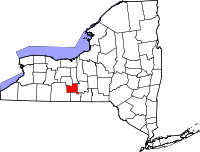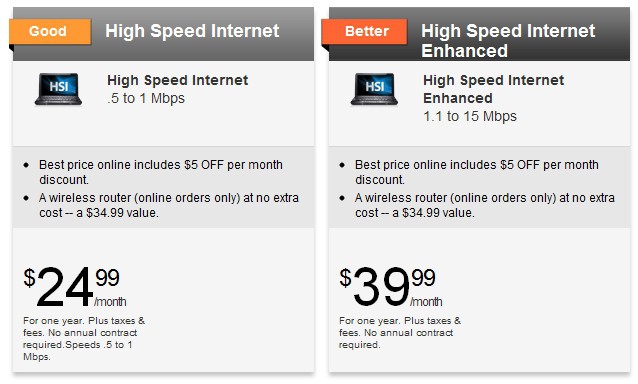
Comcast's shoddy installation work in one Savannah resident's home.
Savannah residents fed up with Comcast Cable’s performance in the Georgia city should see major service improvements soon, the company promised residents and city officials on Thursday.
City officials began investigating Comcast back in January as residents flooded city hall with complaints about the company’s service, billing problems, and treatment of customers. At least 350 formal complaints led Alderman Tony Thomas to suggest Comcast had failed Savannah.
A series of town hall meetings held across the city brought scores of complaints about incompetent service technicians, endless billing errors, and deteriorating service. When the city threatened to consider not renewing Comcast’s franchise, which permits it to operate within city limits, the company quickly began resolving complaints.
Last week, Comcast formally introduced an 11-Point Plan for improved service for Savannah, although many of the promised improvements come with some caveats.
Some of the key components gleaned from the Savannah Morning News:
- Re-introduce the Comcast Guarantee, which gives a 30-day, money-back guarantee; a 24-hour service line; a $20 credit for a late or missed appointments; an easily understood bill and a promise to resolve a problem in one visit or offer a complimentary service. However, this nationwide guarantee was already in place in Savannah and other Comcast service areas, and requires consumers both to be aware it exists and specifically request the company deliver on its promises. Comcast does not volunteer service credits or provide money back or free service unless specifically requested;
- Provide 6,000 hours of training to Comcast technicians over the next year. Contractors cannot participate because of federal regulations regarding non-employees, said Andy Macke, a Comcast vice president. However, many of Comcast’s installers across the country are contractors, and they committed some of the worst offenses for Savannah residents complaining about shoddy installation work. They are exempt from the required training Comcast promises to deliver;
- See whether bus service can be extended to Comcast’s Chatham Parkway office or see whether another local office can be opened. Comcast only operates one walk-in location for the entire city of Savannah. However, Comcast has no authority to require public transportation officials to extend bus service to their cable office and the company has made no concrete commitment to actually another one;
- Quarterly town hall meetings and a city of Savannah hot line to get feedback. Comcast will hold three meetings over the next year, but will use them to promote new products and initiatives. This alters the original intent of the town hall meetings — to provide an opportunity for residents to air grievances, recreating them as marketing and sales events;
- By mid-year, Comcast will extend broadband services to 111 businesses downtown, which will cost about $150,000. However, Macke says only those businesses that express “interest” and fall within the company’s “Return On Investment” formula will qualify for service. Unless Comcast loosens its payback formula, most businesses that couldn’t get Comcast to install service before will remain unqualified to receive it going forward.
 Despite these caveats, most city officials seem relieved the company is now addressing the complaints which turned Comcast’s performance into a political issue earlier this year.
Despite these caveats, most city officials seem relieved the company is now addressing the complaints which turned Comcast’s performance into a political issue earlier this year.
Mayor Edna Jackson told Comcast she was pleased with the company’s improved level of service.
“It seems as if you heard us and the message went out very well,” Jackson said. “You have worked very hard and very diligently.”
Comcast also promises to expand its low-income Internet Essentials broadband service into more parts of its service area. The company reported that out of 18.1 million homes that purchase broadband service from the cable operator, just 41,000 qualified for the Internet Essentials program, which sells low speed Internet access for $10 a month.
[flv width=”640″ height=”500″]http://www.phillipdampier.com/video/WTOC Savannah Comcast Resolving Complaints 4-8-12.mp4[/flv]
WTOC in Savannah covered the city council’s reaction to Comcast’s promises of improved performance for the city’s cable subscribers. (4 minutes)
[flv width=”480″ height=”290″]http://www.phillipdampier.com/video/WJCL Savannah Comcast Promises Improvements 4-8-12.mp4[/flv]
WJCL, which apparently anchors their newscast outdoors, got into the specifics of Comcast’s 11 point plan for better cable service in Savannah (2 minutes)
[flv width=”640″ height=”380″]http://www.phillipdampier.com/video/WSAV Savannah City Council and Comcast Reach Solution 4-8-12.flv[/flv]
WSAV, also in Savannah, called the agreement with city officials and Comcast “a compromise.” (2 minutes)
 Comcast’s national low-income Internet service, Internet Essentials, is getting an upgrade.
Comcast’s national low-income Internet service, Internet Essentials, is getting an upgrade.

 Subscribe
Subscribe






